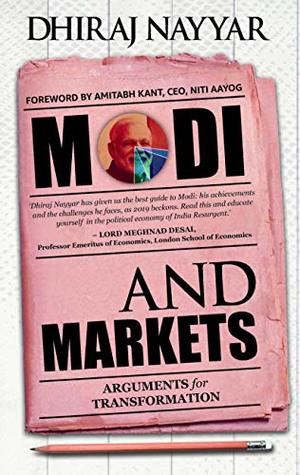Kindle Notes & Highlights
Read between
March 21 - April 1, 2019
India’s rank in the World Bank’s Ease of Doing Business survey improving by forty-two positions during Modi’s tenure.
The Prime Minister took the lead with the PRAGATI video-conferencing with Secretaries and Chief Secretaries of states to find solutions for projects which were either stalled, or delayed indefinitely. Through twenty-five meetings via video-conferencing, Narendra Modi succeeded in clearing over 227 projects worth more than 10.5 lakh crores.
Ultimately, only a vibrant private sector can generate jobs and provide opportunities for India’s youth. Markets are the key to prosperity.
Since 1991, there was always very little conviction and openness about the need for market reform across the political spectrum. Market reform in India had been necessitated by an acute balance of payments crisis and not a fundamental change in the conviction of the broader political economy. Most reform was carried out by stealth in the fear that market reform would be seen as pro-rich or pro-business in a country that was still low income.
The danger of such populism was that it risked throwing the baby out with the bathwater. India needed to be rid of crony capitalism, but not capitalism.
The real nuts and bolts of governance are best learnt at the state level.
India’s politics is uncomfortable with the idea of wealth creation.
The most damage inflicted upon the economy was when Indira Gandhi became prime minister and policies took a sharp turn Left-ward. The
socialist India knew only two kinds of capitalism—the East India Company kind and the crony kind.
‘It doesn’t matter if the cat is black or white, as long as it catches mice.’
The fact is that India cannot solve the problem of poverty or complete its quest for inclusiveness by redistributing a small cake. The size of the cake needs urgent expansion and only wealth creation can do that.
Rahul should rail against crony capitalism but not miss the wood for the trees. India needs a vibrant, competitive private sector to generate jobs.
Modi and his team (rightly) believe that inflation is a result of supply side bottlenecks and not excess demand.
In October 2017, American economist Richard Thaler won the Nobel Prize for his research in the domain of behavioural economics, a relatively new branch of the discipline which eschews some of the assumptions of mainstream economics and gives more weight to frailties in human decision-making. While there was a raging debate (at least on social media) on how fully Thaler supported demonetisation, he did acknowledge its potential in nudging people to change their behaviour, something which seems to be happening. Clearly, the practitioners of this new economics, along with the practitioners of
...more
Law and order versus economic development is often a chicken-and-egg problem: it is difficult to tell which comes first.
Economics is an imprecise, dismal science. Still, it holds out some wisdom for the world.
crippled the economy and saw economic growth fall from 8.5 to 4.5 per cent in a period of three years. It gave the Opposition plenty of fodder to attack the UPA on corruption and its economic record. It gave Kejriwal the opportunity to attack the UPA on Reliance and gas pricing just two months before the general election. And all of that because the UPA forgot that one golden rule of economics: let prices be determined by demand and supply.
In India’s mainstream thinking, it is almost taboo to carry the label of Right-wing. It usually conjures up images of Trishul-wielding fanatics who are out to penalise minorities, or more accurately anyone who disagrees with their view of the world.
Governments that meddle in markets rarely deliver prosperity. They redistribute poverty instead.
The government decided to reassign those blocks using a transparent, online auction rather than a murky and easily corrupted bidding process. The power, steel and cement companies that depend on these coal supplies now have a degree of clarity. Coal-rich states will benefit, as their governments will get the revenue from the auctions rather than New Delhi.
The prime minister doesn’t need upper-house approval to lift fuel, food and fertiliser subsidies, which together account for a third of India’s huge fiscal deficit. The regulation of diesel prices was a particular scandal, benefitting mostly rich SUV drivers and truck transportation companies. Ending it—especially while global oil prices are depressed—was a no-brainer.
Rather than guaranteeing prices, the government should guarantee a minimum level of income, transferred directly through cash subsidies. That would free up farmers to grow riskier but potentially more lucrative crops.
The genes of the Congress descend from its first family. Neither Sonia Gandhi, nor the President, Rahul Gandhi uttered a word to support foreign investment in retail. That they allowed, in steely silence, the public spectacle of a humiliating surrender by the government is sufficient indication of their real view on foreign investment in retail. The reason why the mother–son duo never supported economic reform in public, is because the economics of the free market is an antithesis of the politics of inheritance. The free market brings with it the principle of merit and the importance of
...more
In 2014, and in the subsequent assembly elections thereafter, including in Uttar Pradesh and Gujarat, that strategy came a cropper because the poor marginalised saw through what was clearly a vote-garnering plan by India’s oldest party, which had little or nothing to do with economic progress. Unfortunately, in the long term, that strategy can only succeed if significant number of Indians remain mired in poverty. Two decades of double-digit economic growth, which will happen only with market-oriented reform, could make the poor a very small minority, not enough to win elections. Rahul could
...more


